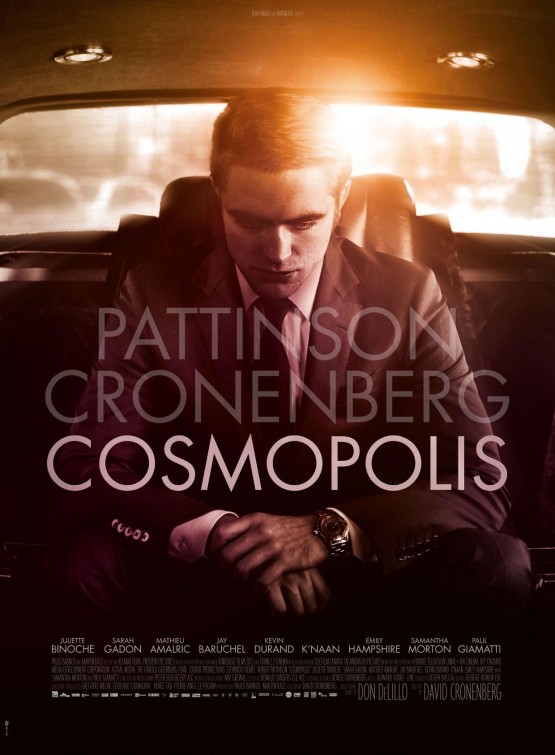Time. Money. Luxury. It’s All Coming Down
Director
David Cronenberg
Starring
Robert Pattinson
Robert Pattinson portrays young billionaire, Eric Packer, a Patrick Bateman for the Lehman economic age and the central focus of this incredibly self-indulgent yet utterly engrossing flick. New York is a hive of activity at the quietest of times but during a presidential visit, a rap artist’s funeral procession and a fiscal protest march, Mr. Packer decides he wants to take his convoy of white stretch limousines across town to get a haircut. Traffic is naturally at a standstill but having converted his limo into a portable office, he continues to conduct meetings and operate with business as usual. This allows the plot to roll on at a steady pace with Packer receiving ‘guests’, arrogantly oblivious to the outside world. As news slowly filters in that his financial holdings are weakening, he begins to descend into a maddening voyage of masochistic destruction.
The suffocating self contained structure ensures that each supporting performance offers something different, while bringing us ever closer to the truth that is Eric Packer. What that means, is the audience is treated to a series of very vibrant one-on-one discussions, much in the same style as a theatrical production. Curiously enough, despite the talent involved, these seem to range a little. We have the likes of Jay Baruchel, Mathieu Amalric and Sarah Gadon offering subtle vignettes that expose the inner workings of the lead while retaining something unique and believable.. something human. But on the other hand, we have almost disorientating appearances by Samantha Morton and most notably Juliette Binoche. I have nothing against either actor and even highlighted Morton’s scene toward the base of this review but I genuinely didn’t get the point of Binoche’s character, who engages in awkward and uncomfortable sex (at least, for the audience) with Packer and then writhes on the floor spewing nonsense before suddenly disappearing. But I digress, no matter how good the minor portrayals are, they are all surpassed by Pattinson in his finest work to date. The only time he nearly sinks into the background is when working alongside Paul Giamatti, but that man is an acting god, so that’s hardly an insult.
At its core, Cosmopolis is a very well-executed release, with unique un-Cronenberg cinematography and direction throughout, that ranges from the safe confines of a pristine neon cell before spiralling into a dark, dilapidated, rotting living room. Much in the same way, the brilliantly tense score by Howard Shore and Metric, builds from absolute silence to a sawing (yes, sawing not soaring) climax. But the visuals, jarring though they may be, aren’t the shining peak of this film; the real resonance stems from the analytical element – for you could say that the entire plot is an analysis of society’s ignorance and self absorbed destruction through the personification of a psychological breakdown. This is why the narrative structure is less important than the actor’s delivery – profound statements recited with an automaton disconnection that serves to add to the poignancy of the remarks. Yet underneath everything, the main character’s sole drive appears to be eating and fucking – the very base and primal ‘wants’ of an imploding individual. The concepts, ideas and performances are all captivating and should have created a strong film with a subtly powerful message.. only they didn’t. Something felt absent, less from the finale and more from the opening two acts. An absence of soul that was requisite for the character and story to work but somehow ended up detrimental to the entire movie.
As with most, if not all, Cronenberg releases, this isn’t for the mainstream. The story is above and beyond what the average cinemagoer can comprehend (harsh but true) and as such they will label it ‘boring, dull and stupid’. In actual fact, it’s an incredibly meaningful piece told through elegant prose and brutally blunt visuals. Having said that, it also mimics its lead to the degree of its arrogant, pretentious and vainglorious opinion of self-worth. You could argue that these problems stem with the book and despite the massive changes from the source material, DeLillo’s novel is not exactly the easiest of reads and far from the heights of his stellar works such as White Noise. In all honesty, you have to be in the right mood /mindset for a film of this nature and as most people are never in the mood to watch this kind of high-brow societal probing, it will falter at the box office and either seduce or irritate critics/snobs. But that’s not to imply that either party is right because despite the cunning wordplay and theatrically emotive acting, Cosmopolis is remarkably hollow. This is clearly Cronenberg’s most niche film in years and whereas Spider onward has been a flush run with audiences and reviewers, Cosmopolis is a stumbling point, a mark of elitism that actively strives to lose those watching. Like the book, the execution of this release is an exercise in frustration; take an incredibly discerning and enlightened central concept, add an uncommon narrative element that misdirects, introduce passing performances, each as riveting as the last bolstered by an extremely enigmatic lead and lace each and every scene with diverse angles, lighting and set dressing. What you should end up with is an unparalleled narrative, rife with career-making portrayals, building to a phenomenal final piece witnessed through the gritted teeth of anticipation. I’d say Inception was the last film to execute that effect so fully. What we have here, however, is a very interesting study that falls short of brilliance.. and it’s a damn shame. In a sentence, Cosmopolis is too fucking clever for its own good and needed Ethan and Joel Coen to interpret it properly.
Release Date:
20th June 2012
The Scene To Look Out For:
As Kinsky [Morton] enters the limo and begins to discuss the nature of time and economic principle, a riot takes place outside. Packer, seemingly oblivious, simply pours a drink and slowly sips as his wheeled impregnable fortress sways. With the damage done and the protesters quelled, Kinsky and Packer then move on to discuss the obsolescence of computers, or more aptly the idea and image of a computer; even how the word ‘computer’ sounds stupid and dated. It’s probably one of the highlights of the first half demonstrating how disgustingly clever and comical the movie is, before being royally upstaged by the final scene.
Notable Characters:
Pattinson rises above every single on-screen counterpart and even above the subject matter. This is a real proving ground for the young actor and in my opinion, he will come out with an exceptional amount of integrity in several critic’s/filmmaker’s eyes. Setting aside his teen heart-throb origin and stepping away from typecast roles like Water For Elephants, his future as a respectable thespian is his to ruin or build on from here on out. Much in the same way that Di Caprio turned everything around in the early 2000’s.
Highlighted Quote:
“A person rises on a word and falls on a syllable”
In A Few Words:
“Ultimately Cosmopolis is a high art character study and like all high art pieces the look is grand, the performances are intense but the overall impact is a tad lost. Personally, I blame DeLillo”
Total Score: 3/5
![The Red Right Hand Movie Reviews [Matthew Stogdon]](https://reviews.theredrighthand.co.uk/wp-content/uploads/2021/12/cropped-header1.png)




